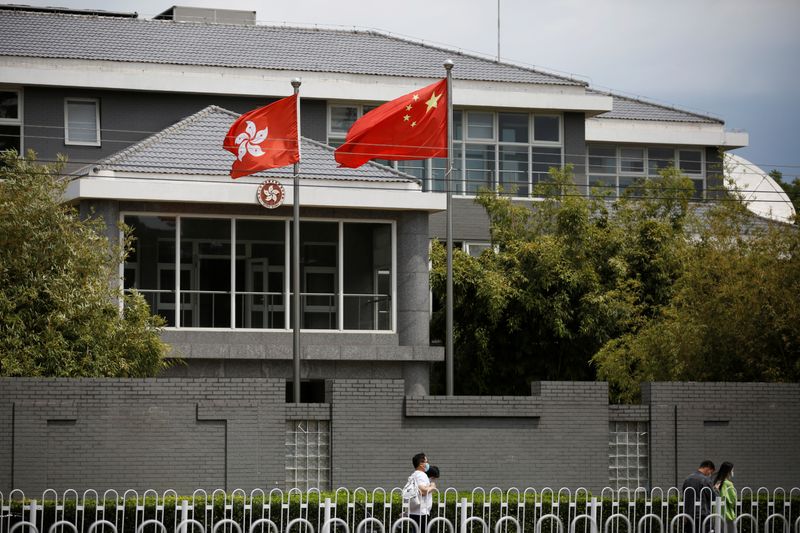By Greg Torode and Marius Zaharia
HONG KONG (Reuters) - Chinese officials have signalled that Beijing plans sweeping electoral changes for Hong Kong, possibly as soon as next week, when China's parliament, the National People's Congress (NPC), opens in Beijing.
WHAT IS BEIJING PLANNING?
Xia Baolong, director of China's Hong Kong and Macao Affairs Office, has said the electoral system in the global financial hub needs to be changed to allow only "patriots" to govern.
Hong Kong leader Carrie Lam said her government would fully co-operate with Beijing in "improving" the political system.
Secretary for Mainland and Constitutional Affairs Erick Tsang announced a bill requiring community-level council representatives to take a "patriotic" oath and then clarified what the term meant.
"You cannot say that you are patriotic but you do not love the leadership of the Chinese Communist Party or you do not respect it - this does not make sense," Tsang added.
"Patriotism is holistic love."
WHAT IS THE BIG PICTURE?
Love might be the ideal, but what Beijing really wants is obedience, control and utterly predictable elections.
The plans are Beijing's latest moves to consolidate its authoritarian hold over Hong Kong after the mass pro-democracy protests and violence that rocked the former British colony for much of 2019.
Last June, Beijing imposed, through the NPC, a sweeping national security law on Hong Kong. Most pro-democracy activists and politicians have found themselves ensnared by it, or arrested for other reasons.
Some elected legislators have been disqualified, with authorities calling their oaths insincere. The opposition then resigned en masse from the Legislative Council, Hong Kong's mini-parliament.
Making district councillors and civil servants swear "patriotic" oaths makes them vulnerable to similar treatment.
Hong Kong's district councils are its only fully democratic institution and the pro-democracy camp took almost 90% of their 452 seats in 2019 elections, humiliating the establishment.
That momentum suggested a small chance for democratic politicians to win an unprecedented majority in legislative elections set for September after a year's delay over coronavirus curbs.
WHAT COULD THE CHANGES LOOK LIKE?
Gerrymandering looks certain. And probably much more.
By design, Hong Kong institutions have been dominated by pro-Beijing politicians since the former British colony's return to Chinese rule in 1997, but the Lam government's unpopularity has exposed risks to Beijing's control.
Half of the city's 70 lawmakers are directly elected in "geographical constituencies," with the rest from "functional" ones representing industries, unions, and professions and stacked with pro-Beijing figures.
Media said electoral maps could be redrawn to suit the pro-Beijing camp, taking the number of geographical constituencies to 18 from 5, as a way of crimping the democrats' popular vote.
Then a 'one vote, two seats' system in each constituency would allow entry to the legislature for the second-placed candidate, probably from the pro-Beijing camp, going by polls that show a split of about 60% to 40% between democratic and pro-establishment sides.
A six-seat district councillors' constituency in the legislature - a democratic stronghold - could also be scrapped.
Beijing is also reported to be considering reshaping a panel of 1,200 elite figures that will choose a new leader when Lam's first five-year term ends in March 2022.
District councillors only have about a tenth of the committee's seats. But the democratic camp's unprecedented win in 2019 now offers a rare theoretical opportunity to be king-makers in close races between pro-Beijing candidates.
WHY IS COMMUNIST PARTY LOYALTY SO VEXING IN CHINESE-RULED HONG KONG?
Generations of Chinese families fled to British-ruled Hong Kong after the Communist Party took power in 1949 and up until recently, city-based Chinese officials have kept a low profile.
The Communist Party still has no open or official locally-registered presence, operating instead through surrogates and proxies.
Key to Hong Kong's enduring freedoms, say many of its residents, is a paragraph in its mini-constitution, known as the Basic Law, that specifies:
"The socialist system and policies shall not be practised in the Hong Kong Special Administrative Region and the previous capitalist system and way of life shall remain unchanged for 50 years."
The Basic Law reflects the "one country, two systems" formula that has long ensured Hong Kong's broad freedom of speech, religion and political action, with its own government except for foreign affairs and defence.
While the city does not enjoy full democracy, universal suffrage is enshrined as a goal in the Basic Law. For decades a thriving civil society contributed to fierce debates in the legislature and elsewhere.
IS THERE MORE TO COME?
Very likely so, on several fronts.
Beijing officials have said Hong Kong's independent judges must also be patriots and that judicial reforms were necessary.
The contours and timing of these are uncertain, but diplomats and businesses are watching closely, seeing judicial independence as the bedrock of Hong Kong's international status.
Hong Kong and Beijing officials, who have repeatedly said rights and freedoms remain intact, are adamant that judicial independence will be maintained.
